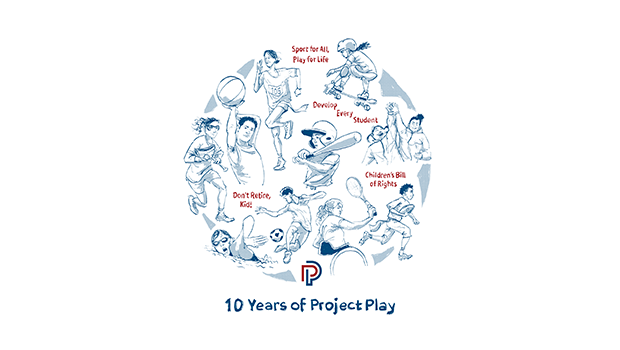It’s football season again. With it comes Friday Night Lights, weekend tailgates, acts of soaring athleticism in the face of danger – and the inevitable, and growing, conversation about the game’s future. Many parents have real concerns about introducing tackle football to their children, given the mounting research on head injuries and their potential long-term impact on cognitive and emotional function.
Last year, in a milestone development that flew beneath the radar of national media, flag football surpassed tackle football as the most commonly played form of the game among children ages 6 to 12, according to annual survey data by the Sports & Fitness Industry Association. Last week, the LA84 Foundation, a major grant-maker to youth sports programs in Southern California, announced that it would no longer fund programs that offer tackle football before age 14.
Today, our Aspen Institute Sports & Society Program releases a 27-page white paper that explores the consequences of this trend continuing. Eight months in the making, it asks: What if flag football becomes the standard way of playing the sport until high school? What are the implications for the sport, its stakeholders, and most importantly, the children who play the game?
We analyze this potential development from five angles:
- Public health: Would delaying tackle football until high school make players safer?
- Youth participation: Would flag bring more children into the sport, or drive them away?
- Friday Night Lights: What impact, if any, might there be on high school football?
- Football industry: What could this mean for the NFL and college football, in terms of talent development, fan cultivation, and long-term bottom line?
- Civic life: How would a shift to flag impact the values promoted through the sport?
We peer into the crystal ball on these questions with the aid of a diverse set of experts convened in January at the Aspen Institute in Washington, DC. The inaugural event in our Future of Sports conversation series, Future of Football: Reimagining the Game’s Pipeline, featured panels that included Dr. Robert Cantu, co-founder of the CTE Center at Boston University; Scott Hallenbeck, executive director, USA Football; former NFL players Chris Borland and Domonique Foxworth; Buddy Teevens, Dartmouth College coach; Jennifer Brown-Lerner, policy manager for the Aspen Institute’s National Commission on Social, Emotional, and Academic Development, and mother of a grade-school boy who plays football; Tom Green, a high school coach in Maryland; and Dr. Andrew Peterson, representing the American Academy of Pediatrics.
Their insights were supplemented with perspectives gleaned from a post-event online survey distributed to attendees of the event and members of the public, including those who watched on livestream. Survey results and comments shown in this report come from 62 responses by parents, high school and youth coaches, athletic trainers, medical professionals and others. Those perspectives — plus Aspen Institute research — form the basis of this report. Each topic includes a discussion of the points of view shared, plus Aspen Institute analysis.
Our overarching conclusion: Children, the game and communities are likely to benefit if flag football becomes the standard way of playing before high school, with modifications. A key modification: Proper tackling technique is taught in in practice settings, and in a controlled manner, in the age group leading into it.
Among other factors, our conclusion is informed by the experience of hockey. A decade ago, USA Hockey recognized that it had a participation problem, with parents concerned about head injuries and kids quitting the game prematurely. The national governing body banned body-checking through age 12, and doubled-down on coach training, describing for stakeholders a clear pathway of progression through the sport. Since then, hockey is one of the few team sports to experience youth participation growth. Tough policy decisions were made that challenged the habits and notions of traditionalists, and the sport benefitted.
We hope this paper provides the necessary thought leadership to advance the game of football, helping parents, sport leaders, educators, policymakers and other stakeholders make reasoned and ethical decisions about improving the delivery of the game for youth, our society’s most valuable resource.
You can read the report here. We welcome your thoughts.
Tom Farrey is executive director of the Aspen Institute’s Sports & Society Program. He can be reached at tom.farrey@aspeninstitute.org. Follow him on Twitter @TomFarrey and the program @AspenInstSport. The Future of Sports series continues Friday, Sept. 14, at 12:30pmET with a livestreamed discussion on the Future of Sports Betting.


